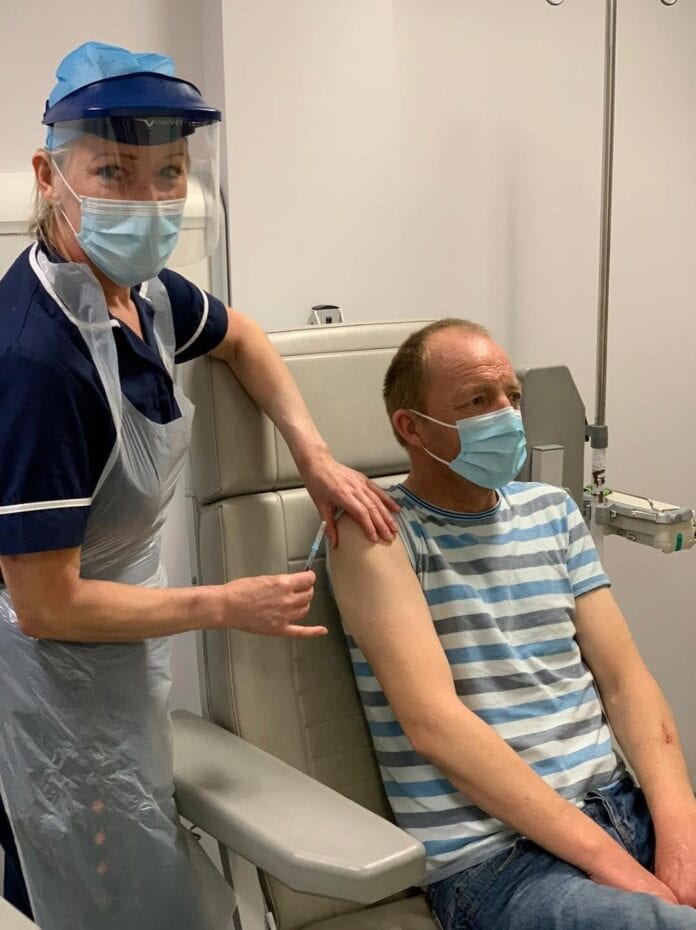Dialysis patients attending Bronglais, Glangwili and Withybush hospitals are among the first in-centre dialysis patients to receive their COVID-19 vaccine in the UK.
Since the start of the pandemic, people receiving renal dialysis treatment have lived in fear of COVID-19. Patients with kidney failure are considered extremely vulnerable to the virus, but they are unable to shield because must attend a dialysis unit regularly for life-saving treatment.
Furthermore, a high proportion are dependent on hospital transport, which also affects their ability to shield, and would have had trouble accessing community vaccination appointments because of their treatment schedules.
However, dialysis patients across South West Wales have now received their first dose in record time due to a delivery programme designed to vaccinate while attending regular dialysis sessions.
Speaking about their experience through the pandemic, one patient said, “We have lived in fear because people on dialysis who catch COVID are far more likely to become very unwell or die.”
Professor Chris Brown, Consultant Renal Pharmacist, said: “Data shows these patients have a much higher risk of death from Covid-19 than the general population.
Treatment for this group of patients has not stopped during the pandemic with over 1,200 dialysis treatments a week being provided by our regional service in Hywel Dda and Swansea Bay university health boards.
“Once we were given the go ahead for urgent rollout by the Hywel Dda vaccination team, we mobilised a team from the renal units to administer the vaccine to patients while they underwent their dialysis treatment.
“Renal pharmacists buddied with a specialist nurse at each of the region’s dialysis centres.
Chris said “Over 99% of patients consented to the vaccine which is extremely high and much higher than may have been expected.
“I believe this is due to the fact that the vaccine was being given by the staff who care for these people week in, week out and who understand their complex care needs.
“The delivery of the vaccine program was extremely effective. The team worked to get the first dose into people over a matter of days and not a single dose of the vaccine was wasted.’’
“This demonstrated that, despite the challenges, administering vaccinations on dialysis units was possible.”
Delivering such an effective programme that included units across the rural areas in Hywel Dda demonstrated to other dialysis centres across the UK that they could follow suit.
Data from across the UK shows that once infected with COVID-19, a person receiving in-centre haemodialysis has a 1 in 5 risk of death within two weeks; far higher than the risk of death from COVID-19 in the general population which is under 1 in 200. This means a 30-year-old in-centre dialysis patient has the same risk of death if infected with COVID-19 as an 80-year-old in the general population.
Delyth Timmis, Senior Clinic Manager and Lead Renal Nurse at Glangwili Hospital’s renal unit, said: “When we were delivering the vaccine, one patient told me that being offered the vaccine in familiar surroundings was a big relief and that it felt like we were ‘injecting hope’ and helped them feel more protected.”
Owain Brooks, Renal Pharmacist, said: “We heard about their experience through the pandemic, one patient told me they have ‘lived in fear because people on dialysis who catch COVID are far more likely to become very unwell or die.’”
Chris concluded: “The dedicated staff who make up this very special renal service have worked relentlessly throughout the pandemic and under significant pressure to care for people who rely on us. The vaccine programme offers much needed hope for better months ahead.”



| [donate]
| Help keep news FREE for our readersSupporting your local community newspaper/online news outlet is crucial now more than ever. If you believe in independent journalism,then consider making a valuable contribution by making a one-time or monthly donation. We operate in rural areas where providing unbiased news can be challenging. |
















